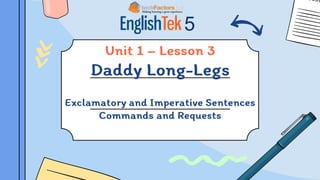
EnglishTek_5-Unit_1-Lesson_3.pptx
- 1. 5
- 2. Reading ● Answer literal questions about a text read ● Take down notes about passages heard ● Give an advice to a friend Language ● Distinguish between the form and function of exclamations, commands, and requests ● Rewrite commands as request and requests as commands ● Use appropriate commands and requests in a given situation ● Write an advice column
- 3. An asylum is a safe place or sanctuary for people who need protection. An orphanage is sometimes referred as an asylum, because it provides sanctuary for children who do not have parents, guardians, or relatives. In the outer circles, write down the words you associate with the word “orphanage”.
- 5. Jean Webster was born in New York in 1876. Known for writing about smart female protagonists, Webster grew up in a house dominated by strong women in the family. She attended Vassar College where she became interested in politics, drama, and writing. When not studying, she visited charity homes where she drew inspirations for her works. Her two books, Daddy Long Legs and When Patty Went to College, are her most popular works. Her books are generally described as humorous but they raise social awareness regarding women as well. She died in 1916 at Sloan Hospital for Women.
- 6. From the first paragraph, we learn that the character in the story is an orphan. To whom is she writing? Wy does she call this person “Daddy”? The character grew up in an orphanage, which she refers to as an “asylum” or a mental hospital. Why does she compare the orphanage to a mental hospital?
- 7. Answer A and B on Page 27-28 (Reading book)
- 8. Liberal Questions ask for information that is directly started I a reading selection. Inference Questions require you to interpret details implied in the text.
- 9. Read the passage “What Dress Do I Wear?” on your EnglishTek Reading Book, page 29, and answer the questions that follow. Tell whether the given questions is literal or inference. Write literal on the blank before each number. ________1. Whose party is Joanna preparing for? ________2. If you where Joanna, would you have the same dilemma? ________3. What advice would you give to Joanna? ________4. Who is Joanna’s best friend? ________5. Is Joanna able to borrow a dress from her best friend? ________6. Did you have an experience similar to Joanna’s? ________7. Do you care about what other people think of you? Why or why not? ________8. What is Joanna worried about? ________9. What does Joanna think about at the end of the story? ________10. What advice does Romina give?
- 10. Tips in taking down notes:
- 11. Notes can help you recall and memorize lessons during review. But nothing can beat learning lessons by heart. Taking down notes can take up your time and attention during class discussion, but make sure that it does not keep you from completely understanding each lesson.
- 12. EnglishTek (Reading) Page 31 Your teacher will read passages related to giving advice. On a piece of paper, write down the important details from each passage. Your teacher will access your notes after.
- 13. An advice is a suggestion or recommendation that has something to do with future action. We usually give advice to help or comfort people. Giving advice can be difficult, especially when a person does not think he/she needs one.
- 14. Here are the things that you have to keep in mind when giving advice.
- 15. Before asking anyone for advice, make sure you know what to ask. What bothers you? What are you worried about? Explain you situation to the person before asking his/her opinion. Here are some questions that you can ask.
- 16. Find a partner, and talk to him/her about each concerns. Do not forget to ask for and give advice. Englishtek Reading Book, page 32
- 17. Thank You Card
- 18. Exclamation An exclamation or an exclamatory sentence expresses strong feelings like anger, happiness, or excitement. An exclamation begins with a capital letter and ends with an exclamation point (!). Exclamations can be used to emotionally express a fact or to share your strong opinion regarding an event, person, thing, or issue.
- 19. That is a wonderful idea! I hate this song! We don’t know where to go or how to get there! Hello! Hooray! Bye! Oh no! Yeah! Wow!
- 20. Commands and Requests A command or an imperative sentence tells someone to follow an order. Commands usually begin with action words. A command can be formed like a statement or like an exclamation.
- 22. Requests A request expresses a command politely. Words like please and kindly are added to a command to phrase it as a request. Examples:
- 23. Answer the Grammar Workout activities on your EnglishTek (worktext) A, B, and C Pages 18-20
- 24. Advice Column is a section in the newspaper or magazine. People send a letter or just a question telling about their problems and asking for advice or suggestion regarding what to do about these problems. Sometimes, people send their questions anonymously or use code names. The writer of the column responds with an answer and helpful advice.
- 25. Here is an example of an advice column.
- 26. Write your own advice column on the space below. Make use of commands, requests, and exclamations. Englishtek Worktext, page 21
- 27. 5
Notes de l'éditeur
- Listen to what the person has to say. Be open to his/her suggestion and try to look at your problem from his/her perspective. Be honest and sincere. Make sure to thank them for their help.